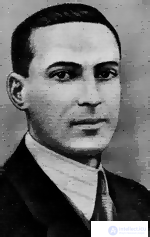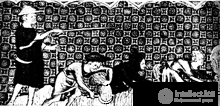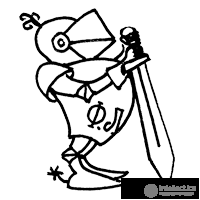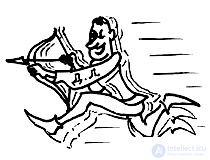Lecture
Until now, there is a perception that logic and man are inseparable, that there are no people who do not use logic. This view is contrary to scientific facts.
It has been experimentally established by psychologists that at first a person has a concrete thinking, and only then, much later, an abstract one. According to the age psychology, a preschool child thinks only in a concrete way, through sensual images, abstract thinking is formed in his school.
If you take the history of mankind, then there is a similar picture. It is known that people originally lived in the communities and only then moved on to public life. So: the primitive convent (savage) only thinks specifically. Abstract thinking appears only in society, in the cultural environment.
Is it a coincidence? Let us show, based on reliable historical material, that there can be no talk of chance
We will strictly distinguish between community and society. A community is a small group of relatives, built on the fundamental equality of its members in joint activities. The presence of a leader in any community does not contradict this definition at all: the leader is only the first among equals, he does not oppose himself to the rest. The picture changes only with the decomposition of the community, with the transition to society. What is society? This is a large collective built on territorial connections and fundamental inequality. It is about the inequality that flows from the division of labor into mental and physical. There is no such division in the community; it exists only in society, which is why it is often said so: “social division of labor”.
Employees of mental and physical labor occupy an unequal position in joint activities: the first at the top, the second at the bottom. In this regard, any society resembles a layer cake. The unequal position of workers is explained by their labor roles: a knowledge worker is a social organizer, someone who creates a plan of social activity, lowers it down and monitors its implementation, an employee of physical labor is a direct performer, someone who implements the idea of an organizer creating on its basis material wealth.
It is easy to notice the opposite nature of the activities of these types of workers, if you pay attention to their immediate product: the organizer creates an idea (intangible object), the performer creates an embodiment of the idea (tangible object). The opposite of activity requires completely different skills, on the one hand, from the organizers, on the other - from the performers. Therefore, in society from childhood, some are trained for the role of organizers, others for the role of performers.
In the community, labor is not divided into mental and physical, but in society it is divided. Why? The fact is that such a division arises only when there is a need for organizing mass labor, that is, labor carried out by the masses - a huge team, the effectiveness of which is determined not by the specific, individual properties of its members, but by their abstract, extremely generalized properties. . Any society, even the earliest, is built on the organization of such abstract labor, but the community is built differently: its support is the specific, individual properties of each community member.
Let us recall the so-called "foci of the most ancient civilization," that is, the places where the transition from community to society took place. There are only four such places: Egypt, Mesopotamia, India and China. And the tribes lived here, the main occupation of which was agriculture. Why is this important to mention? Because it was the development of agriculture in these four areas that required the organization of mass labor, and with it the transition to social life: periodic floods of large rivers, flooding vast areas of fertile land, could be curbed only by large-scale irrigation systems, and only a multi-tribal mass could create it, having a single plan of action.
A community action plan is an idea. But, as was noted at the beginning of the lecture, the savage does not have abstract thinking, which means there are no ideas. How did they appear in the head of a community member who was called upon to play the role of an intellectual worker, an organizer of social activity? Life itself has led to a transition to abstract thinking. Already in antiquity, an action plan had to be drawn up for hundreds of thousands of people, many of whom the compiler of the plan had never seen. Under these conditions, it was necessary to transfer the images of specific, well-known people to the organizer to the unknown, and such a transfer entails mistakes: famous people can be very different from unknown ones. By correcting these errors, the organizer follows the path of averaging, generalizing sensory images until the appearance of limit generalizations - ideas. 
L.S. Vygotsky,
the creator of Soviet experimental psychology,
Proved that abstract (rational) thinking is the result of the development of concrete (sensual) thinking
Ideas arise from the organizers, and from them go to the performers. As a result of the spread of abstract thinking, systematic mass work became possible, opening up new horizons for humanity
So, the transition from concrete thinking to abstract is undoubtedly intellectual progress. But all progress has a reverse, negative side. In this case, the reverse side of progress was the misunderstanding that arose in public life. I will formulate the problem it caused in the form of a paradox: living in society, people usually speak the same language, but often do not find a common language. Where did this attack come from, if there was nothing like this in the community? The fact is that the thinking of the organizers and performers is multidirectional: in the first the thought moves from the concrete to the abstract, and in the second - from the abstract to the concrete. As a result, the same words acquire a different meaning, and it is more abstract with the organizers than with the performers.
Misunderstanding represents a huge threat to society, as it leads to inconsistent actions of the organizers and performers, failures, accidents and catastrophes. It means that it was necessary to fight with this intellectual misfortune. And here, for the first time, people paid attention to their own thinking, became interested in how they think and how they should express their thoughts so that there is no misunderstanding. In response to these questions, people developed knowledge that they did not have before and which eventually became known as "logic."
That is how the logic arose. From the material examined by us it is clear that its main function is the struggle against misunderstanding by studying abstract thinking. This struggle can be effective only if all members of society adhere to the same logic, and at first logical studies were purely individual, each spontaneously creating for itself its own, homegrown logic.
Philosophers took up the situation. They set a goal to work out a common logic for all, a generally valid logic, in order to force everyone to use it only. Strictly speaking, ancient and medieval philosophy was not interested in logic, but in the art of eloquence, or rhetoric. Developing in the framework of the latter, the logic gained independence only with the transition to a new time. We will not consider the pre-scientific, rhetorical period of the development of logical knowledge. Focusing on the history of scientific logic
In the new time, taking on the creation of scientific logic, scientists saw their task as follows: it is necessary to identify all the forms (techniques, schemes, methods) of thinking that are used in society, to check their effectiveness and to divide into correct (effective) and incorrect (ineffective). Then the correct forms should be brought into the system, stated in the textbook, and made everyone learn the logic according to this textbook so that everyone would use the same rules in their thinking.

The social division of labor in the XIV century:
harvest under the leadership of the master clerk
The logic that studies forms of thinking is called formal. At first it seemed that there could be no other scientific logic besides the formal one. However, life has refuted these ideas. When crises arose due to the need for a radical restructuring of society, it turned out that formal logic not only does not help social development, but, on the contrary, acts as a reactionary, conservative force. The fact is that any society must develop, change the forms of its existence, including the forms of thinking, and formal logic is distracted from this. It does not take into account that those forms of thinking that are now effective sooner or later become ineffective, and when a social crisis arises, stubbornly imposes on thinking that which is already obsolete.
In this situation, as opposed to the formal, a dialectical logic is created - logic that studies the content of thinking. Let's clarify how the form differs from the content. The shape of the object is its rigid framework, it is a stable structure, it is a set of elements arranged in a certain way. As for the content, it represents the influence of form elements on each other, their movement relative to each other. To study an object formally means to take it in statics, as absolutely motionless, steady; on the contrary, to study an object meaningfully means to take it in dynamics, as absolutely changeable. Thus, formal logic takes thinking as static, unchanging, always existing according to the same laws, and dialectic - as moving, changing, continuously moving from one law to another.

Formal logic:
on guard
Which of the two logics to choose to overcome the problems constantly facing us? And it is necessary to choose, because, as noted above, logic can successfully perform its function, i.e., to fight misunderstanding, only if it is the same for all members of society.
The choice between the formal and dialectical variants of scientific logic is extremely difficult, since the merits of one of them are the shortcomings of the other. Formal logic is good when the subject under study is at rest, but when it changes, moves, you need to use dialectical logic. In practice, they do it this way: you can escape from the movement - you think formally-logically, you can't - you think dialectically. 
Dialectical logic:
Long live the revolution!
But the existence in society of two variants of generally valid, scientific logic is an abnormal situation. The material world is one, movement and peace do not exist in it without each other, but by creating a scientific picture of this world, scientists cannot make ends meet, since formal logic makes them absolutize peace, and dialectical makes movement. In addition to the theoretical, there is also a practical side to the problem of world exploration. The sharp acceleration of social development in recent decades requires the continuous control of both the form of society (so that it does not collapse) and its content (so that changes are timely). Hence the growing need for logic, which equally allows to take into account both stability and mobility. In the middle of the XIX century, such logic appeared.
I have in mind the materialist dialectical logic, or materialistic dialectics, the main provisions of which were developed by K. Marx. The name of this logic indicates its main difference from classical dialectical logic: if the latter is idealistic, that is, strictly speaking, this is idealistic dialectical logic, then Marx’s dialectic is materialistic. Representatives of idealistic dialectics, considering the relationship of being (material existence) and thinking, proceed from the primacy of thinking, and the representatives of materialistic dialectics, on the contrary, from the primacy of being. 
Eternal battle of formal logic with dialectic
Demanding to explore the world in the unity of its moments of stability and variability, the materialistic dialectic incorporates all the best of both opposing versions of scientific logic considered earlier and cuts off their weak points.
Comments
To leave a comment
Logics
Terms: Logics